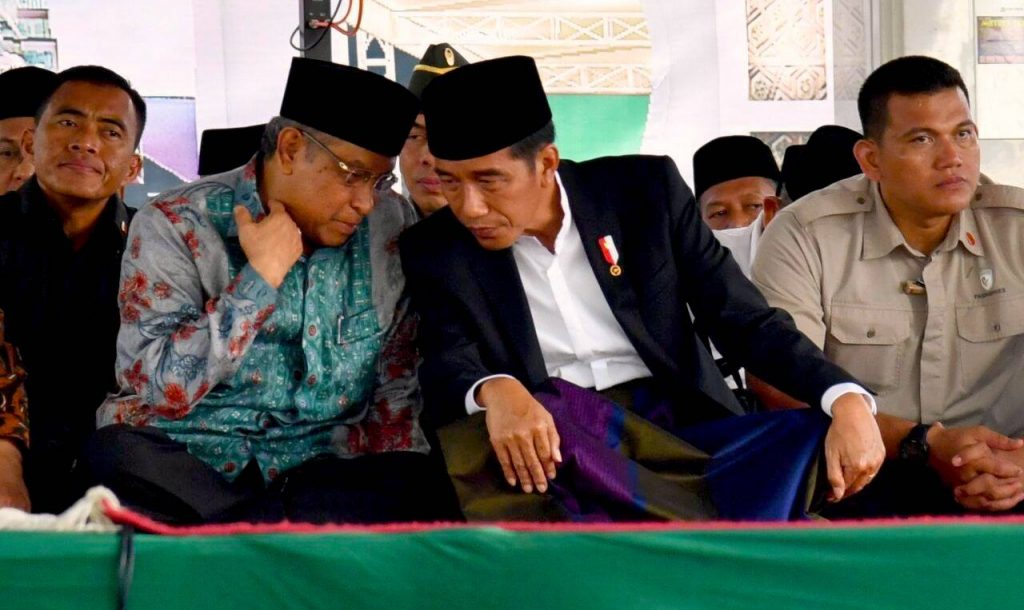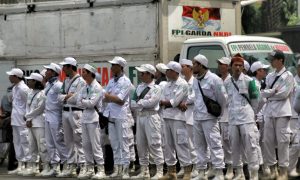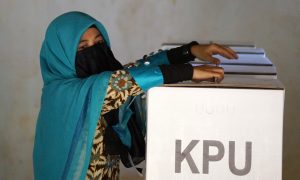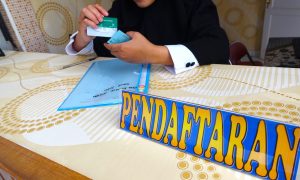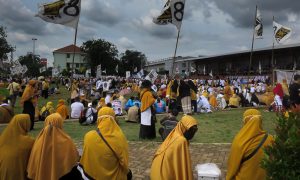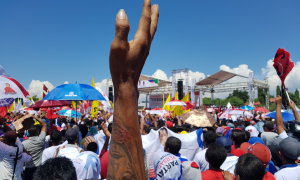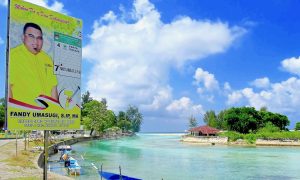Support from Nahdlatul Ulama (NU) was a key factor in President Joko Widodo (Jokowi)’s victory in the 2019 election. An exit poll from Indikator Politik showed that most people claiming affiliation to NU voted for Jokowi, with a 12% increase compared to the 2014 election. On the ground, a shift in endorsements and support from Prabowo to Jokowi within big NU pesantren (Islamic boarding schools) across Java was highly visible during the campaign period. Today, NU elites publicly express that they contributed significantly to helping Jokowi secure his second presidential term.
Questions now revolve around what NU expects in return from Jokowi, and whether it will exert a significant degree of influence over the direction of Jokowi’s policies on religion. NU’s desire for a reward for its massive mobilisation for Jokowi is not really surprising, given the horse-trading that had been going on ahead of the last elections. But it is NU’s promoting a strong religious nationalism, and doing so from its strongest position ever in government, that will perhaps have the most long-lasting effects for Indonesia’s religio-political discourse in the coming years.
Jokowi’s new cabinet
The most basic thing NU expects from Jokowi’s second term is the continuation of government programs that have been built up in NU pesantren since 2017, namely the Sharia Micro-Finance Institutions (LKMS) and Vocational Training Centres (BLK). These programs benefit the grassroots NU (nahdliyyin), who frequently mentioned the programs and gave credit to Jokowi in when I spoke to them in pesantren during the 2019 campaign. Another is the government’s promise to expedite the passage of the Pesantren Bill, which, in Jokowi’s words, will provide “a legal umbrella for having allocations in the state budget [for pesantren]”.
Measuring the ‘NU effect’ in Indonesia’s election
Ma’ruf Amin's electoral benefit was smaller than often assumed—but it was enough to get Jokowi over the line.
Until the election of Khofifah Indah Parawansa as Governor of East Java in 2018, there were a record six ministers from NU backgrounds in the Jokowi cabinet, as the president himself once pointed out—the largest number since Reformasi. Of these six, three come from the PKB, one from the United Development Party (PPP), one non-party figure nominated on PKB’s recommendation, and one from Jokowi’s campaign team. They have held various portfolios: Minister of Religious Affairs, Minister of Labour, Minister of Youth and Sports, Minister of Villages, Minister of Research and Higher Education, and Minister of Social Affairs. Yet what NU has been waiting for—and this is sometimes expressed as a specific wish—is a minister of its own, appointed directly from the NU Central Board (PBNU).
Intra-Islamic rivalries
The government’s horse-trading with NU might affect NU’s relations with other Muslim organisations. Muslim organisations that supported Prabowo, such as Front Pembela Islam (FPI), framed Jokowi’s alliance with NU as part of what they called the government’s “politik belah bambu” to divide-and-rule the Muslim ummah. Some prominent Muhammadiyah figures have expressed their concerns about the government’s making Muhammadiyah its second-favourite after NU. Some NU figures, on the other hand, saw Muhammadiyah as not being assertive enough in showing its commitment to Pancasila and combating “radical” groups. As a result, in the Jokowi era, NU–Muhammadiyah political relations have been marked with heated exchanges of words.
For example, as mentioned by Gus Yaqut above, NU would like to win the education portfolio in the new cabinet. The current education minister is a member of Muhammadiyah’s central leadership board—the only minister from Muhammadiyah—who replaced Anies Baswedan, after Anies was dropped from cabinet in 2016 and proceeded to run in the Jakarta gubernatorial election. There was an intense controversy in 2016–2017 when the minister planned to launch a “Full Day School” policy. PBNU released an official protest, and NU followers held rallies against it on the grounds that the policy could undermine the traditional education system in pesantren.
In 2015, as per his 2014 campaign promise while in pesantren, Jokowi created a new public holiday—“National Santri Day”—in commemoration of NU founder Hasyim Asy’ari’s fatwa obliging Indonesian Muslims to fight (“jihad”) against the Allied Forces in Surabaya on 22 October 1945. Muhammadiyah saw the establishment of the holiday as “polarising the Muslim ummah between santri and non-santri”. This year several Muhammadiyah prominent figures implicitly criticised the politicisation of Muslim organisations and the government’s favouritism towards NU, which they said was deepening the polarisation between NU and other Islamic communities.
In the 2019 election, NU certainly was much more unabashed in its expression of support for a presidential candidate, while Muhammadiyah’s stance was relatively neutral. However, the behaviour of their respective communities told a different story: NU–Muhammadiyah polarisation was reflected in the Indikator exit poll which showed that while 66% of Muhammadiyah-affiliated voters chose Prabowo, 56% of nahdliyyin voted for Jokowi.
Whether Jokowi’s favouritism towards NU will influence the formation of the incoming cabinet remains to be seen. Yet NU is convinced that it deserves its fair share of ministerial posts. As Gus Yaqut told me: “we strived hard campaigning for Pak Jokowi. Muhammadiyah didn’t do the same. Isn’t it a reasonable thing to say that we better get seats in the cabinet?”
Is there a single “NU agenda”?
More important than political horse-trading is perhaps the question of where Jokowi’s second term is headed ideologically on religious policies. NU will very likely be influential in this regard. NU’s degree of influence over the government, and the Jokowi administration’s willingness to satisfy NU’s demands, have already been indicated by the dissolution of Hizbut Tahrir Indonesia (HTI) in 2017 and the selection of Ma’ruf Amin as a vice-presidential candidate. In the latter case, the president had to sacrifice his personal preference under the threat that NU would not guarantee total support for Jokowi should he pick a non-NU vice presidential candidate.
At the same time, NU has its own internal religious dynamics, and is very often not unified on many religious issues. The ideological tendencies within NU communities (nahdliyyin) are diverse. The organisation is home to conservatives, progressives, leftists, and even liberals. Disagreements among its followers have occurred at times, including between high-ranking kyais, though sometimes not expressed publicly.
The diversity of voices within NU also means that—despite some people’s worries that Ma’ruf Amin will entrench religious conservatism in Jokowi’s government—NU has the potential to provide a counterweight from within its own community. To provide several examples: Ma’ruf was main figure in declaring the heresy of Ahmadiyah, but some nahdliyyin were also part of the community that facilitated intra-faith dialogue with Ahmadis. Ma’ruf was head of the Indonesia’s Ulama Council (MUI)’s Fatwa Commission when its East Java branch declared Shiites deviant—which provided justification for their persecution. But some nahdliyyin were also part of those defending Shia as a legitimate school (mazhab) of Islam. Many NU kyais have more than one wife, but feminist Muslims are emerging among nahdliyyin, and NU helped facilitated Indonesia’s Female Ulama Conference that challenged the view that polygamy is an Islamic practice. Ansor’s militia, Banser, has long been mobilised to guard churches during Christmas celebrations, while it was only last year that Ma’ruf made a public Christmas greetings for Christians. Ma’ruf became an expert witness in blasphemy trial against Ahok, but some NU politicians, including Gus Yaqut, have expressed a desire to revise the blasphemy law. If Ma’ruf would later promote an intolerant policy in his position as vice president, Gus Yaqut told me, “we would still respect him as an senior NU kyai, but Ansor and Banser would take a firm stance against it.”
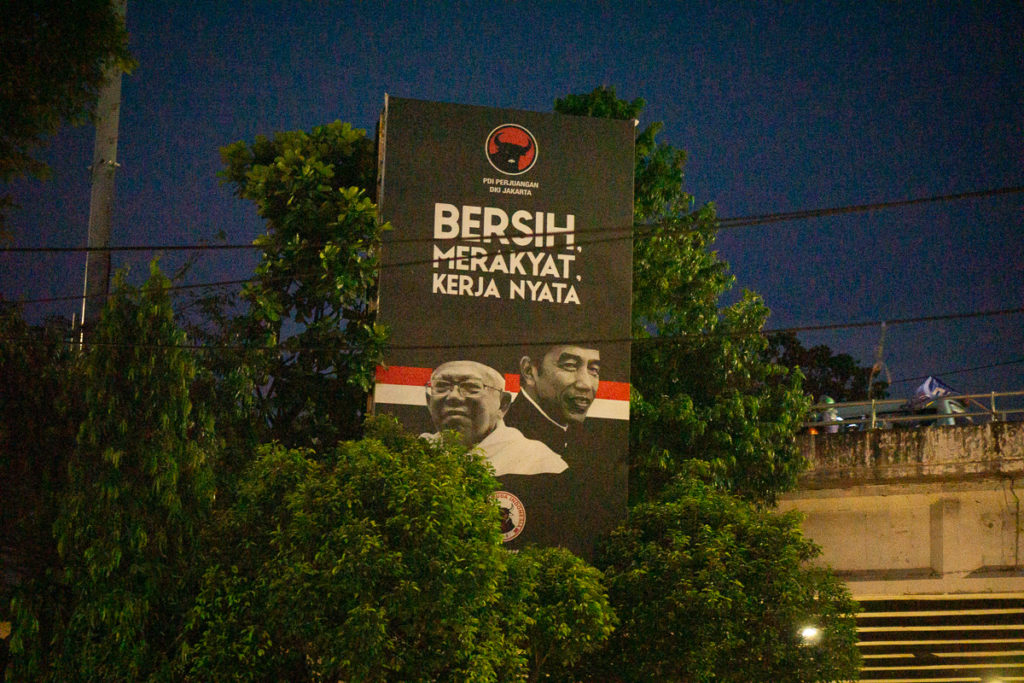
JOKOWI AND MA’RUF AMIN ON A CAMPAIGN POSTER, JAKARTA, MARCH 2019
Unity behind “Pancasila democracy”
Recent developments, however, show that there have been two things that unite nahdliyyin across ideological tendencies, including the conservatives (there are exceptions of course, but they are very few). The first is the defence of “Islam Nusantara”—essentially, traditional Indonesian Islamic practices as represented by NU—against religious puritanism. The second is the dissolution of Hizbut Tahrir Indonesia (HTI) and the battle against its remaining influence.
The dissolution of HTI was strongly backed by NU, and followed a series of events where Banser reported HTI’s public activities to the police, suggesting that the events had to be broken up. Concerns about the removal of the requirement for a court’s approval to dissolve an organisation, which existed in the 2013 Law on Mass Organisations and was revoked by the 2017 Regulation in Lieu of Law (Perppu Ormas) that was used to dissolve HTI, featured only little in NU community discussions.
Indeed, with the exception of those who are also human rights advocates, the dissolution of HTI barely faced internal opposition within NU. A PBNU member, who is generally seen as a progressive on other issues, even claimed that NU had long campaigned for it and suggested “the government’s dissolution of HTI was late”. On this matter, Gus Yaqut told me that “NU’s support for the dissolution of HTI had nothing to do with the 212 movement. We had proposed it long before, since the SBY era. And actually HTI could still go to court after the government’s ruling. They did, and we didn’t interfere with the judges’ decision.”
A typical NU defence of the HTI dissolution relies on the fact that some Western liberal countries had banned Hizbut Tahrir (with Germany being the most cited), or the argument that Indonesia’s democracy is not liberal but instead one that must be in line with Pancasila—“Pancasila democracy”. NU leaders’ rhetoric quite often implies that (1) (dis)agreement with the government decision to disband HTI is suggestive of one’s patriotic commitment to the nation, and that (2) nationalism takes precedence over (liberal) democracy. NU leaders at times share the saying that PBNU stands for the four pillars of Indonesia’s national values: Pancasila (the national ideology), Bhinneka Tunggal Ika (the national motto, “unity in diversity”), NKRI (the Unitary State of the Republic of Indonesia), and UUD 1945 (the Constitution).
In 2017, around 20,000 nahdliyyin gathered on the slopes of Mount Lawu in Central Java to declare the Front Penggerak Pancasila (Driving Pancasila Front) movement and commit to “tak[ing a] firm stance against those who try to replace Pancasila”. The slogan “NKRI Harga Mati” (“NKRI Fixed Price”, i.e. non-negotiable/irreplaceable) is now more popular than ever among NU people. This strong nationalist view also serves is also the reason why, in the view of many NU leaders, the Islamic Defenders Front (FPI) shouldn’t be a target, at least for the moment: because FPI still upholds the integrity of NKRI (despite its adding the adjective “Bersyariah”).
Imposing Pancasila?
Historically, NU’s political and ideological standpoint has been in an ever-evolving state. In Indonesia’s early days, NU was not a full-fledged supporter of Pancasila, as it is today. In the second half of the 1950s, during the Constituent Assembly meetings, NU along with the modernist Islamic party Masyumi favoured Islam over Pancasila as the state’s foundation. In the 1970s, members of PPP—the only Islamic political party allowed by the New Order regime, led by NU’s then-supreme leader Kiai Bisri Syansuri—walked out of a parliament meeting held to promulgate the Guidance for the Education and Implementation of Pancasila or Pedoman Penghayatan dan Pengamalan Pancasila (P4) and the Pancasila Morality Education or Pendidikan Moral Pancasila (PMP)—Pancasila indoctrination courses which were compulsory for civil servants and public school students respectively.
It was only during 1980s, and the rise of Abdurrahman Wahid (or Gus Dur) in the NU leadership, that NU began formulating the theological justification that Pancasila is the best basis for governing state–religion relations in Indonesia. The 1980s was the decade when the New Order regime issued its policy on the Pancasila as the Sole Foundation (Asas Tunggal), under which all organisations were forced to adopt Pancasila as their organisation’s sole ideological basis. There is debate about whether NU’s acceptance of Pancasila at the time was a sincere one, or rather due to state imposition. Regardless, from then on, the slogan “Pancasila is final” began to be popularised among NU followers.
Today, there is no question about NU’s commitment to Pancasila. Indeed, NU’s support of the government is pushing the “Pancasila democracy” discourse to its most prominent level since Reformasi. As we know, 2017 was the first time since 1998 that Pancasila was used as a legal justification to disband an organisation—namely, HTI. In the same year, the government also established what is now called the Agency for the Implementation for the State Ideology Pancasila (BPIP); Ma’ruf Amin and the current PBNU chairman Said Aqil Siroj are two of its nine steering committee members. News have been circulating about BPIP’s plan to “re-popularise” (membumikan kembali) Pancasila to curb growth of Islamism in public universities and schools through their curriculum. This brings up a big question as to how such a scheme will differ from the New Order’s indoctrination through P4. A recently-reported government plan also involves bringing in BPIP to supervise job application tests for civil servants.
To be fair, NU—and Indonesia’s pluralist groups in general—are facing an understandable problem: what they perceive as “Islamist, radical” groups are indeed producing discourses that can threaten Indonesia’s national values, and surveys show they these groups have a great and growing following among the middle class. The question that follows, however, is whether NU’s (and some other pluralist groups’) support of using the state apparatus to combat that ‘’Islamic radicalism”—specifically by imposing Pancasila—will indeed reduce the threat and increase acceptance of Pancasila, or instead boost the Islamists’ self-victimisation narratives and strengthen their distrust and enmity toward the state and NU itself.
Studies in other Muslim-majority countries show that banning an Islamist organisation can lead its members instead go underground, due to the narrowing legitimate space for their movement. Some of them find violence to be their remaining option. In the Indonesian context after the dissolution of HTI, it’s too early to make the same conclusion. Some formerly HTI-affiliated figures can still give public talks—in recent news, Felix Siauw, one of the most popular HTI-linked preachers, was still able to give public lecture at the Jakarta city hall’s mosque despite protests from Banser. Regardless of whether the top-down approach in combating radicalism is proven ineffectual or counter-productive, NU will bear some degree of responsibility for Pancasila reclaiming, to some extent, the role it played during the New Order era as a tool for delegitimising political opponents. The difference is that today NU is on the side of the government.
 Facebook
Facebook  Twitter
Twitter  Soundcloud
Soundcloud  Youtube
Youtube  Rss
Rss 